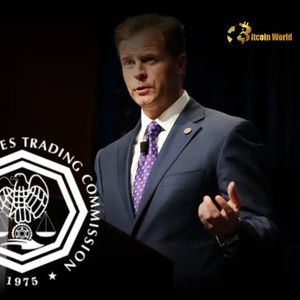Crucial Clarity: Brian Quintenz Vows to Shape US Crypto Regulation at CFTC
7 min read
BitcoinWorld Crucial Clarity: Brian Quintenz Vows to Shape US Crypto Regulation at CFTC The world of cryptocurrency is buzzing with anticipation, and much of that energy is focused on regulatory clarity. For too long, navigating the legal landscape for digital assets in the United States has felt like traversing a maze with shifting walls. This uncertainty impacts everything from innovation and investment to consumer protection. That’s why the recent news surrounding Brian Quintenz, the nominee for chair of the U.S. Commodity Futures Trading Commission (CFTC), is generating significant interest. Quintenz has stepped forward with a clear pledge: to bring much-needed clarity to US crypto regulation . Who is Brian Quintenz and Why Does His Nomination Matter for Brian Quintenz CFTC ? Brian Quintenz isn’t a newcomer to the regulatory or crypto space. He previously served as a CFTC commissioner from 2017 to 2020, giving him direct experience within the agency he’s now nominated to lead. Following his time at the CFTC, he took on a role as head of policy for a16z crypto, the dedicated crypto fund of venture capital giant Andreessen Horowitz. This background is particularly noteworthy. His tenure at a16z crypto placed him at the heart of the industry, engaging directly with developers, entrepreneurs, and investors grappling with the existing regulatory ambiguity. This unique perspective—having seen the challenges from both the regulator’s and the innovator’s side—positions him to potentially bridge gaps and foster a more workable framework for Brian Quintenz CFTC leadership. His nomination hearing is a critical step, scheduled for June 11, where he will outline his vision and face questions from lawmakers. The Urgent Need for Clear US Crypto Regulation Why is regulatory clarity such a hot topic? The current state of US crypto regulation is often described as fragmented and inconsistent. Different agencies, primarily the CFTC and the Securities and Exchange Commission (SEC), have asserted jurisdiction over various aspects of the crypto market, sometimes leading to overlapping or conflicting guidance. This lack of a unified, clear framework creates significant hurdles: Hindered Innovation: Startups and established companies are hesitant to build and launch new products or services for fear of running afoul of regulations that aren’t clearly defined. Investor Uncertainty: Both retail and institutional investors face confusion regarding which assets are regulated how, and under whose authority, impacting confidence and participation. Market Fragmentation: The lack of clear rules can push legitimate crypto businesses to operate outside the U.S., potentially limiting domestic growth and job creation. Enforcement by Litigation: Without clear rules, regulators have often resorted to enforcement actions to signal their stance, which is costly, time-consuming, and reactive rather than proactive. Quintenz’s pledge directly addresses this pain point, suggesting a potential shift towards a more proactive and structured approach to establishing US crypto regulation . Understanding the CFTC’s Role in CFTC Crypto Regulation The CFTC’s primary mandate is to protect market participants from fraud, manipulation, and abusive practices related to futures, swaps, and other derivatives. Under current law, the CFTC generally regulates crypto assets that are deemed commodities. Bitcoin and Ethereum, for example, have been referred to as commodities by CFTC officials in the past, particularly in the context of futures markets. The CFTC’s involvement in CFTC crypto regulation has historically focused on derivatives products like Bitcoin futures contracts traded on regulated exchanges. They have also pursued enforcement actions against platforms and individuals involved in fraudulent activities related to commodity-classified digital assets. Quintenz, having served at the CFTC, is intimately familiar with the agency’s powers and limitations. His nomination signals an intent to leverage the CFTC’s existing authority while potentially advocating for legislative changes to broaden or clarify its role in overseeing the broader spot crypto market, especially concerning preventing manipulation and ensuring market integrity. This focus on market oversight is a critical component of his stated goals. Tackling the Complex Challenge of Token Classification One of the most significant challenges in regulating crypto assets is determining what they actually are from a legal perspective. Are they securities, commodities, or something else entirely? This question of token classification is central because it dictates which regulatory body has primary jurisdiction (SEC for securities, CFTC for commodities, etc.) and what rules apply. Quintenz’s emphasis on token classification is crucial. A clear, consistent framework for classifying digital assets based on their characteristics and use cases could provide the foundational clarity the market desperately needs. This isn’t a simple task, as many tokens have hybrid features or evolve over time. Potential approaches to token classification could involve: Developing specific tests tailored to digital assets, potentially building upon existing frameworks like the Howey Test (used for securities). Creating new legislative categories for certain types of tokens. Providing clear guidance on when a token transitions from potentially being a security (e.g., during a fundraising event) to potentially being a commodity or utility token (e.g., when a network becomes decentralized and functional). Quintenz’s background, including his time engaging with the diverse range of projects at a16z crypto, suggests he understands the nuances involved in token classification and the need for a practical, forward-looking approach. What Could Quintenz’s Leadership Mean for Crypto Market Oversight ? Beyond classification, Quintenz’s focus on crypto market oversight aims to ensure fair and orderly markets, prevent manipulation, and protect participants. This involves looking at exchanges, trading platforms, and other intermediaries. Effective crypto market oversight under the CFTC could involve: Establishing clear rules for crypto trading platforms that list commodity-classified digital assets. Implementing surveillance mechanisms to detect fraud and manipulation across these markets. Setting standards for customer protection and custody of digital assets under CFTC purview. Working with international regulators to address the global nature of crypto markets. His experience at the CFTC gives him insight into the tools and strategies the agency uses for traditional markets. The challenge and opportunity lie in adapting these tools effectively for the unique characteristics of decentralized digital asset markets. His time in the industry likely provided valuable insights into the operational realities and technological capabilities of crypto platforms, which could inform a pragmatic approach to crypto market oversight . Potential Benefits of Quintenz’s Approach If Quintenz is confirmed and successfully implements his vision for clear US crypto regulation , the benefits could be substantial: Increased Investment: Institutional investors, often wary of regulatory uncertainty, could feel more comfortable entering the market. Boosted Innovation: Developers and entrepreneurs would have a clearer path to build and deploy new technologies and services within the U.S. Enhanced Consumer Protection: Clear rules can better protect individuals from scams, fraud, and market manipulation. Greater Market Integrity: Defined oversight helps build trust in the market’s fairness and reliability. U.S. Leadership: Establishing a clear framework could position the U.S. as a leader in the global digital asset space. Challenges on the Horizon Despite the optimistic outlook, the path to clear CFTC crypto regulation and broader U.S. clarity is not without challenges: Congressional Action: Much of the desired clarity may require new legislation from Congress, which can be a slow and politically complex process. Inter-Agency Coordination: Effective regulation requires seamless cooperation between the CFTC, SEC, and other relevant bodies like the Treasury Department and Federal Reserve. Historical tensions or differing views can complicate this. Balancing Innovation and Regulation: Finding the right balance between protecting investors and fostering technological advancement is a delicate act. Overly strict rules could stifle innovation. Market Volatility and Evolution: The crypto market is constantly evolving with new assets and technologies, requiring regulations to be adaptable and forward-thinking. Looking Ahead: The June 11th Hearing and Beyond The upcoming nomination hearing on June 11th will be a crucial moment. It will provide the first public opportunity for Quintenz to elaborate on his plans for US crypto regulation , his approach to token classification , and his strategy for crypto market oversight under the banner of CFTC crypto regulation . Lawmakers will likely probe his views on key issues, his relationship with other regulators, and how he plans to navigate the complex political landscape. His confirmation, if it occurs, would place someone with direct industry experience and a stated commitment to clarity at the helm of a key U.S. financial regulator during a pivotal time for digital assets. While significant legislative hurdles may remain, a clear, proactive stance from the CFTC under his leadership could provide a vital piece of the regulatory puzzle, offering a potential blueprint for other agencies and Congress to follow. A Compelling Summary Brian Quintenz’s nomination for CFTC chair and his pledge to clarify US crypto regulation represent a significant development for the digital asset space. With his unique background spanning both regulatory enforcement and direct industry policy, he is positioned to potentially bring a pragmatic and informed approach to complex issues like token classification and crypto market oversight . While challenges remain, particularly regarding legislative action and inter-agency coordination, a confirmed Quintenz could spearhead efforts within the CFTC to provide the clarity that the market desperately needs, fostering greater innovation, investment, and protection within the rapidly evolving world of crypto assets under clear CFTC crypto regulation . To learn more about the latest crypto regulation trends, explore our article on key developments shaping the future of digital asset policy. This post Crucial Clarity: Brian Quintenz Vows to Shape US Crypto Regulation at CFTC first appeared on BitcoinWorld and is written by Editorial Team

Source: Bitcoin World


